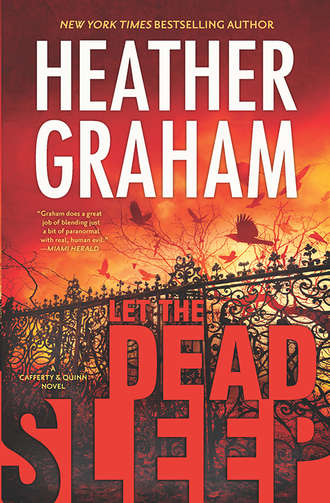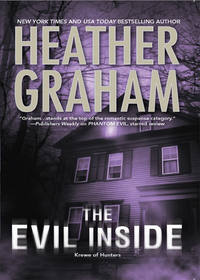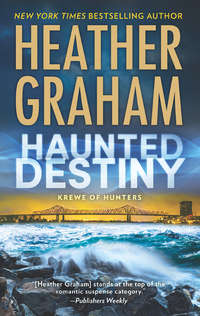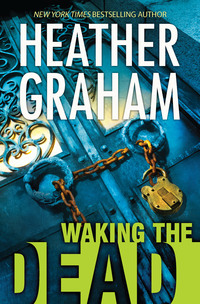
Полная версия
Let the Dead Sleep
Quinn knew it well enough. He’d been assigned these streets as a cop. He’d had informants in the area and was acquainted with a few junkies who’d happily sell their own mothers for the money to get just one more hit.
Digger Duffy’s was a strange establishment. Digger himself was a businessman who had happened to inherit the bar. He didn’t do drugs; he didn’t even sip on a beer. Two years in prison for knocking over an elderly lady and stealing her watch had given him religion.
He was a good guy. He didn’t try to reform folks and he didn’t turn them away. If they wanted to talk, he talked. If they wanted redemption, he tried to point them in the right direction. If they wanted a beer or a whiskey, he served it.
Drug dealers kept their business out of the bar, but everyone knew what was going down on the streets. They might be conducting business outside or nearby, but they didn’t do it in Digger’s.
Digger eyed Quinn as he walked inside, passing tables where men huddled in conversation and where the occasional loner sat gazing morosely into his beer.
Quinn sat at the bar in front of Digger. Digger kept cleaning glasses, raising a brow. “You here for the margarita special?” he asked doubtfully.
“A soda water. Throw in a lime if you want to get fancy,” Quinn told him.
Digger nodded, preparing the drink. “Who you looking for, Quinn?”
“A thief.”
Digger thought about that for a minute. “Haven’t heard ’bout anything major on the market lately,” he said.
“This isn’t your usual wallet or handbag,” Quinn explained. “This is a lethal object—although not many people would think of it as such.”
Digger was skilled at remaining expressionless but his slight frown made Quinn think he might know something—even if he hadn’t realized it before Quinn’s description.
He leaned close as he set Quinn’s soda on the bar. “Some guys figure they can slip through the police cracks and find collectors...and some of ’em do. Some ‘wind up’ with objects they believe they can cash in on. I did hear some talk earlier about a piece of art.” He lowered his voice. “There’s a collector in the city who likes cemetery art—and is willing to pay a lot for it.”
“You wouldn’t happen to know anything about the thief or the buyer, would you?”
He shook his head. “Didn’t really know the guy who was in here. I’d seen him around before. He’s usually into petty stuff—helping himself to a tourist’s purse, hanging around the casino to see who leaves a bag hanging on the back of a chair... He’s never been into violence, hasn’t got that reputation, anyway. Heard him on a cell phone, talking about some house in the Ninth Ward and how if the buyer wanted the piece, he could get down there.”
The Ninth Ward was the easternmost downriver portion of the city—the largest ward in New Orleans. It was where the summer of storms had done their worst damage. Celebrities, Habitat for Humanity and other groups had tried hard to pick up the pieces. The destruction and the destitution, even as the years passed, remained prevalent. Crime was high.
“Can you give me a little more on that?” Quinn asked.
He whirled around, aware of movement behind him as he voiced the question. He was licensed to carry his gun, a no-nonsense Magnum, but he’d learned through his military experience and the academy not to draw until he meant to shoot.
The man standing behind him was as old as Digger and his color was gray. He had rheumy green eyes. Quinn sensed integrity as well as sadness in his manner.
“I heard him talking, too,” he told Quinn. “And I done hear tales about that ‘art piece’ that was nabbed. You go get it back, Mr. Quinn. We have enough crime and death going on here. You go get that bust or statue thing or funerary ornament or whatever it is. Bury it deep so it don’t come up again. Upper Ninth Ward—I heard someone talking about North Robertson Street.”
Quinn thanked him, placed a few bills on the bar and left. Heading for his car, he put through a call to Larue, asking the detective to meet him on North Robertson.
It was late as he drove through the areas of the city he loved; revelers were still out on the streets but in smaller numbers.
The reconstruction since Hurricane Katrina had been spotty and the demographics had changed drastically. Some decent citizens had returned, but some never would. The face of the Ninth Ward was ever-changing. A hard-working waiter might live next to a hastily reconstructed crack house.
Quinn turned down North Robertson Street. In the darkness and shadows alleviated only by a few blinking streetlights, he slowed to a crawl and looked intently at each building he passed.
He came to a pale blue clapboard house. To one side, a new wooden structure was rising. On the other was a derelict building with a sign that was fading and still proclaimed We Will Be Back.
There was something on the ground in front of the blue house.
Quinn pulled to a stop, braked his car and stepped out. He ran over to the object on the ground, hunkering down quickly when he realized it was a man, a youth of mixed race.
The earth beneath him was soggy with blood; there was no help for him.
He’d been riddled with bullets from some kind of semiautomatic weapon.
Cursing softly, Quinn stood.
He saw a scared child peeping out from behind a curtain at the new house next door. A door started to open.
“Stay in! Stay inside!” Quinn shouted.
More gunfire flared from within the blue house. Quinn drew his weapon and moved toward the entry.
He burst in, but too late.
A woman lay on the floor—young, dressed in shorts that left the curves of her buttocks visible, a halter top and five-inch gold-spangled spike heels. She was dressed like a hooker and—living in an obvious crack house—probably was.
For a split second, he felt torn. The killer might still be in the house.
The bust might still be in the house.
But she lay gasping and trying to breathe.
He hurried to her side and crouched down.
“Help me!” she gurgled, large brown eyes staring into his.
“Lie quiet, don’t try to talk,” he told her, ripping his shirt for a bandage to staunch the flow of blood pouring from the bullet hole in her chest.
No good. She gripped his arm with bloody fingers as he pressed on the wound.
He watched the light fade from her eyes.
A door to the rear slammed.
Quinn stood; the hooker was dead.
He followed the sound of the slamming door.
* * *
The book had chapters on all manner of creatures and things.
One of the first sections Danni read was on witches. It wasn’t a bunch of mumbo jumbo about boiling cauldrons and spells; it began with the definition of the word, how witch became an evil creature in medieval Europe, and how there was a fierce difference between the pagan religions that had brought forth the medieval fear of witches and the religious practices then common throughout the colonial America.
She felt as if she’d picked up a history book.
But then, as she came to the end of the section, there were instructions on disabling a “practitioner of black magic and those worshipping the evil creations within satanic churches.”
Danni sat back, staring at the old tome. It went from being an educated treatise to a magician’s manual.
She flipped one beautifully printed and illustrated page after another. There were pages that dealt with ghosts, or “spirits remaining despite the pall of death.”
“Where would I find evil statues—or busts?” she murmured aloud. There were all kinds of ghosts, apparently, and a great deal of information on “intelligent or active” hauntings and “residual” hauntings.
There was a section on banshees.
Nothing in these pages on funerary busts.
But then, of course, the book was huge. There were at least a thousand pages in it.
She yawned, blinking, and realized she was exhausted. The words began to swim before her eyes and she decided to give up for the night.
There was nothing she could do for Gladys Simon now. The book wasn’t going anywhere; she could continue reading in the morning.
But once again, she lay in bed awake. It suddenly occurred to her that she didn’t even know what the bust looked like. She tried to remember how Quinn had described the piece—and as she tried to visualize it, she rose, turned on the lights again and went to her computer.
She keyed in a number of variables, including funerary busts, New Orleans cemetery bust thefts...ancient busts...stolen artifacts...and assorted combinations. Finally, under a website titled Really Weird Stuff That Really Happened, she found what she was looking for.
The bust was beautiful. It was sculpted out of marble in the likeness of a Roman with handsome, refined features. Even in a picture, however, the eyes were strange. They’d been carved in careful detail. Though the bust had only shoulders and a head, its incredibly realistic appearance was chilling. The shoulders were covered by a mantle, which flowed in a way that seemed to suggest angel wings. But because of the expression in the eyes, the whole of it struck her as far more demonic than angelic.
“It’s a thing!” she said once again. “An object.”
Still, it was easy to understand how a fragile or damaged mind might see something more ominous in the bust, or even believe that it talked or whispered to them.
The website didn’t have much more about the bust—other than that death and mayhem seemed to follow it everywhere. And that, most recently, it had been placed in a cemetery in New Orleans.
Most recently! The site hadn’t been updated lately, not with background on the bust.
Now that she had a picture, Danni went through other sites looking for more background information. After an exhaustive search, she was delighted to discover an obscure site dedicated to the bust. The writing was in Italian. She read some Italian, but quickly became frustrated and then remembered that all she had to do was find a translation site on the internet.
That took another few minutes but soon she was reading away—and it was a sad and tragic story. Well, sad for the family of Pietro Giovanni Miro, if not for the brutal man himself.
Tragic for those he’d used and murdered.
He’d been a contemporary of Lorenzo de’ Medici, son of the Count of Abacci and heir to his family’s fortunes and estates. Ambition had been the driving force in his life—something initially admired by his father and contemporaries. But he hadn’t liked to lose, not in battle and not in gaming with his friends and certainly not when it came to his passions.
The first person reputed to die at his hands was a mistress who’d supposedly betrayed him with a member of the de’ Medici household; her name had been Imelda and, perhaps, since her family had a pedigree but no money, she’d been trying to force Pietro to marry her. She died horribly when a fire broke out in the stables at her modest estate and she was trampled by the six massive horses within. An accident, of course. But accidents seemed to occur whenever Pietro was angry. Friends met with bizarre and mysterious deaths. Luigi Bari died when a griffin made of stone toppled from a parapet; he’d won a sum of money from Pietro in a card game. Bartollo Gammino, an actor in a show that spoofed local politicians, including Pietro Miro, died when his costume combusted, burning him to a crisp.
At Pietro’s small private palazzo, there were parties every night, but even the noble youths who attended them most often went only once or twice. The depravity practiced at the parties went far beyond their expectations—and their tolerance. Pietro enjoyed provoking an orgy and slaughtering animals over the sexual participants, noting who did and did not seem to wallow in the blood. It was whispered that he was a satanist, killing animals in the name of his evil lord. Many whispered that they’d seen men and women slaughtered there, as well, but none would speak of it to the authorities.
Local girls disappeared after a night with Pietro or at his beautiful palazzo. Most were peasant girls, and at first, little was noted. Pietro always had an alibi or the ability to appear as a victim. Once, when a body was discovered on his grounds, he killed one of his closest servants, blaming the man for the girl’s death.
Nobility could get away with a great deal.
Finally, when Lorenzo de’ Medici was at the height of his power, one of his cousins, Emiliglio, came afoul of Pietro. It was over a woman again. She was found in the Miro tomb in the la Chiesa di St. Antonio e Maria, outside the city proper—stabbed, disemboweled and decapitated. Just as workers discovered her body while repairing a wall to the crypt, Emiliglio de’ Medici was found, strangled in a horse’s harness.
Emiliglio, a man with no hope of acquiring the family money or power, was still a beloved figure among the people of Florence at the time.
Lorenzo de’ Medici received a petition for Pietro’s arrest, but it didn’t come to that. Pietro was brought down by a mob in the center of the city, hanged and slashed to ribbons by the furious people whose lives he had touched through his brutality.
His father, bereft, had begged Lorenzo for the remains of his son’s body and Lorenzo had relented—on one condition. The body must be cremated to satisfy the fury of his Catholic subjects who were convinced his evil could only be stopped through the cleansing force of fire. However, his father might have his ashes and the urn might rest in the family vault.
And so, Pietro’s father had hired one of the finest sculptors in the city and had the bust carved in his honor. The bust had sat in the family tomb for the next two centuries. Then the family ran into a streak of tragedy and violence until the last male heir died in the nineteenth century. The bust was stolen from the tomb just before the outbreak of World War I and a serial killer was unleashed on the city; it mysteriously reappeared at the tomb when the man was shot down by a local magistrate.
Then came World War II, and the bust was stolen again, never to return to its place at the Miro tombsite.
It had traveled among some of the cruelest dictators in the world...and made its way to the United States.
To New Orleans.
And it was still out there now.
Danni leaned back, rubbing her eyes. She glanced at the clock. It was past three in the morning and she hadn’t slept. Quinn was out there, too, hunting down the bust. Well, that was his choice. A marble bust was a material object, with no life of its own; it couldn’t behave in either an evil or a kindly manner.
But...
She drummed her fingers on the desk. The human mind was a powerful force. If Gladys Simon had believed the bust was evil, that it could control her, then it might have done so.
Danni had faith and she had her personal set of beliefs and ethics, but she’d never fooled herself about the fact that some of the most heinous acts in history had been carried out in the name of religion. She’d grown up in New Orleans and had dozens of friends who practiced voodoo—without an evil thought or wish in their heads. Nor did she have any evil Catholic friends, although the church had been responsible for events such as the Spanish Inquisition and the burning of thousands of innocents as witches or heretics. And the pious Pilgrims had been responsible for the hanging of nineteen and the pressing to death of one in Salem, Massachusetts. The Pilgrims had believed in the devil; they’d believed he could dance in the forests of their bitter cold clime and entice the greedy.
But maybe Quinn was right in being so determined to find the bust. Maybe others had read about the bust and believed in its power, too.
She had to sleep. She knew she had to sleep.
Hating Michael Quinn and wishing he’d never entered her life, she forced herself to lie down and concentrate on sleeping.
In the end, she dozed on and off. But in her thoughts, her restless dreams, she could see her father standing across a vast body of water, reaching out to her. She shouted to him. Despite the distance between them, she saw there were tears in his eyes and she didn’t want him to feel any hurt—he had been the best father in the world.
She could hear him shouting to her. She listened so hard and finally she could hear his words coming to her.
Read the book, and look to it in all things.
The water began to churn as if there were a storm coming. She heard the pulse of the waves, heard them pounding.
Look to the book, daughter. Use the light. The light...
What light, Dad? This is all so crazy! I never knew. Why didn’t I know? You wanted to protect me.... Oh, Dad!
You must never sell the shop. I am with you, even if I failed you.
You never failed me, I swear. I loved you so much. I’m not weak, Dad, I’m really not weak. I’m your daughter.
She woke with a start.
Light was streaming in the bedroom windows because she’d never closed the drapes.
And there was a pounding. It was at her door.
“Danni?” Billie called. “Danni—you all right?”
“Yes, Billie, I’m fine! What’s wrong?” she called back.
“Uh, nothing. I was just checking to make sure you’re okay. It’s almost noon.”
Noon!
She gritted her teeth. She’d slept away half the day.
Damn that Michael Quinn.
Could it all be real?
And if it was... No, her father had never failed her.
Would she fail him?
Chapter Five
“I’M STARTING TO think I should be more worried about you than the damned bust,” Larue said, heaving an exhausted sigh as he sank into the chair behind his desk.
Quinn shrugged. “I’m not saying what’s real and what’s not—just that death follows that bust.”
“Or you—when you’re looking for it,” Larue muttered. “Another two dead, another precinct involved—and no bust and no explanation,” he said. “What happened to bring you out there just in time for that particular murder?”
“I told you. I was in a bar. I asked a couple of guys if they’d heard anything. Larue, listen. There’s a buyer somewhere in the city and I need to find out who. Word’s out that someone—with money—wants the bust. As long as down-and-outers, as well as habitual criminals, know there’s a buyer, people will keep killing others over the bust.”
“Why kill the hooker?” Larue asked.
He had crime scene photos in front him on the desk. One photo of the man dead in the yard and the other of the woman Quinn had watched die.
“Because she was there,” Quinn replied.
“The first guy—”
“Check out your forensic evidence. I think you’ll find that the dead man is the thief who broke into Gladys Simon’s house as she was busy committing suicide,” Quinn said.
“So, whoever killed the thief and the hooker now has the bust. That’s what you’re telling me?”
“Yes.”
“Do you have any idea of this person’s identity?”
“Sure. It’s another thief thinking he can buy his way out of the ghetto.”
“You don’t happen to have a name for him, do you?”
“No.”
“Or a way to learn a name?”
“No.”
“So, while I’m looking for a killer, without the least conception of who it might be, you’re going to be looking for the same man—because you think he has the bust.”
Quinn lifted his hands in a vague motion. “Thing is, when you find your killer, you still won’t stop the killing.”
“Because of the bust?” Larue sounded tired and skeptical.
“To someone out there, it’s a rare commodity and the offer for it is high,” Quinn said.
“Why didn’t this buyer just contact Hank or Gladys Simon?” Larue asked.
“Maybe they didn’t know in time that the Simons had the thing. I didn’t know myself until I heard about Vic Brown being in jail, ranting and raving. If a smart thief has a lead on an object, he won’t share that information.”
“So you have no direction you can give me?”
“All I can give you is what you already have as a good cop, Larue,” Quinn told him. “Find out about our dead thief and his girl. Find out who the hell else knew what he was up to. It was taken by someone in his circle. Someone who knew what he was going to do—and where he was planning to make the sale.”
Larue picked up a folder and tossed it back down. “Dead man—Leroy Jenkins, arrested three times for possession, out on probation once. His girlfriend? Ivy Hunter, three arrests, all for prostitution. Known associates? Half the dealers in the city, including the new group that poured in to take advantage of the open market after the storms.”
Конец ознакомительного фрагмента.
Текст предоставлен ООО «ЛитРес».
Прочитайте эту книгу целиком, купив полную легальную версию на ЛитРес.
Безопасно оплатить книгу можно банковской картой Visa, MasterCard, Maestro, со счета мобильного телефона, с платежного терминала, в салоне МТС или Связной, через PayPal, WebMoney, Яндекс.Деньги, QIWI Кошелек, бонусными картами или другим удобным Вам способом.









